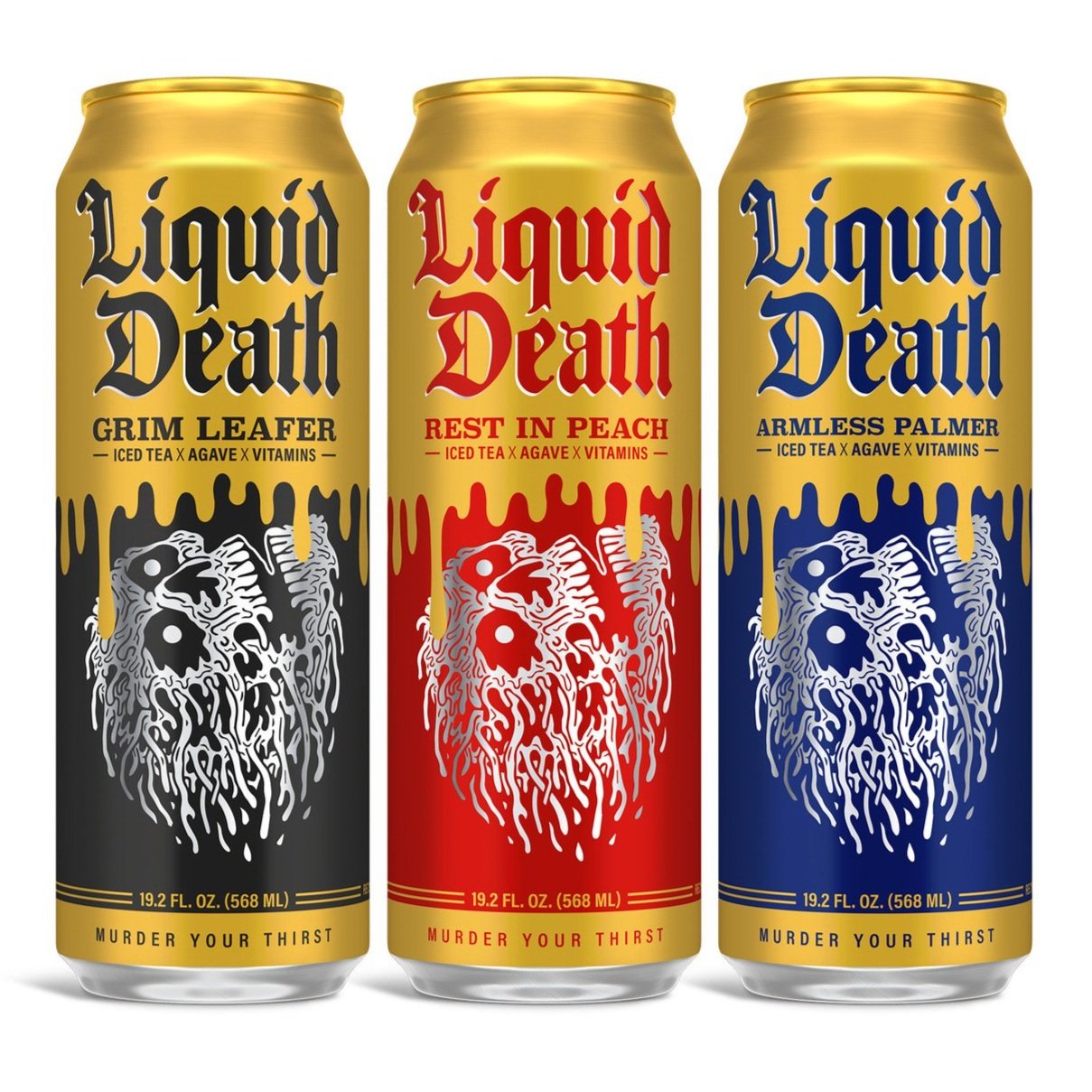Could Liquid Death murder the kombucha market?
I can confidently say that Liquid Death is one of the most exciting & entertaining brands in the world right now, and not just in the beverage space. Their punk rock aesthetic and irreverent attitude is hugely resonating with consumers, making them a stand-out brand in the crowded beverage market.
But the question remains, could Liquid Death murder the kombucha market if they released a kombucha range?
First, let's talk about the kombucha market. It's a fast-growing industry that has seen a big surge in popularity in recent years. With the US kombucha market valued at $1.52 billion in 2020 it is expected to be at a staggering $7.05 billion by 2028. Up until now consumers have been drawn to the supposed health benefits of kombucha, including improved gut health and immune function. It is fair to say the word “kombucha” has a superfood type halo around it.
This kombucha halo has served the market leading kombucha brands like GT's and Health-Ade very well, often presenting clear brand archetypes of the nurturing caregiver, the cure all healer or the magical mystic which all fits in very well with their main consumers avatars of the yoga loving hippy.
However is it time for the kombucha market to be shaken up? Where are the truly exciting and inspiring brands in the kombucha space that have a Rebel, Outlaw or even court Jester type personality that really go against the grain of the traditional category characters, frankly they are nowhere to be seen.
mic check and enter stage left Liquid Death Kombucha!
I could talk endlessly for hours about why a brand of Liquid Death’s caliber should enter the kombucha market. There is so much room and frankly a real need in the kombucha market for a brand with this personality style. Liquid Death which already has a well-established punk rock image would easily stand way out a the sea of peace and love health only focused brands. (much respect to these other kombucha brands, many of them are our very valued Manna-K Kombucha Ingredients customers)
Mike Cessario, the founder of Liquid Death, has proven to be both successful and creatively talented in creating an iconic brand that has taken the beverage market by storm. Mike himself being call a marketing genius by Forbes Magazine. His unique vision for the brand's punk rock aesthetic and irreverent attitude has resonated with consumers, and his execution of the brand's marketing and advertising campaigns has been nothing short of brilliant. From partnering with unconventional influencers to creating hilarious & entertaining viral social media content, Cessario has demonstrated a keen understanding of what it takes to build a successful brand in today's competitive market. With his track record of success, it's no wonder that many are excited to see what Liquid Death will come up with next, whether it's a kombucha range or another exciting venture they could easily also play outside of the beverage space.
Now, let's talk about Liquid Death's potential for success in the kombucha market. One advantage they have is their existing fan base. Liquid Death has already built a strong following of consumers who love their brand, and many of these consumers I believe would be extremely interested in getting their hands on a Liquid Death Kombucha. Additionally, their punk rock aesthetic and irreverent attitude could be a refreshing change for consumers in the current kombucha landscape and appeal to a much broader audience.
If you were in Liquid Death's position what sort of product would you launch? Would a shelf-stable kombucha that delivers on a light and natural kombucha flavour appeal to a more mainstream audience? This might involve creating a product that is not too acidic, with a pleasant taste that is not too overpowering, bitter or funky. By making kombucha accessible to as wide a range of consumers as possible who may not have tried it before or have previously been put off by the intensity of some other kombucha brands in the market. A shelf-stable product for a brand like this would also be more convenient for retailers, making it easier to distribute and transport. By creating a kombucha product that appeals to a mainstream audience, Liquid Death could potentially capture a larger share of the market and continue to grow their brand.
So, how much of the market share could Liquid Death potentially take or even create?
The kombucha market is projected to continue growing at a rapid pace, with some estimates suggesting that it could reach $7.05 billion. If Liquid Death were to capture even 10% of this kombucha market, it could translate into a $700 million opportunity.
To ensure success in the kombucha market, Liquid Death would need to create a product that delivered on consumer expectations for taste and quality, of course that they already expect & know from Liquid Death current product range of mountain waters & ice teas. They could effectively & quickly achieve this kombucha kombucha production at scale by outsourcing their production to a US copacker and using a high quality pre-fermented kombucha ingredient like Manna-K Kombucha.
Liquid Death's unique and always entertaining marketing could be a game-changer in the kombucha market, wat if they created partnerships with conventional kombucha personality types like Gwyneth Paltrow, who could be transformed into an axe-wielding goth-inspired zombie figure to promote Liquid Death kombucha. The potential for Liquid Death in the kombucha market is enormous, and it could be very exciting to see what the brand comes up with next. Will they or others take up this opportunity?
As a kombucha ingredients company, we love working with exciting innovative brands that are open to trying new products and creating new exciting opportunities. By supporting innovative and creative brands, we can help drive the kombucha market forward and encourage more brands to push the boundaries.
Many Thanks, Denis
For clarity, I have absolutely no knowledge of Liquid Death launching a kombucha and i am not aware of their product pipeline, this is just a fun article to write on some ideas i’ve had.








